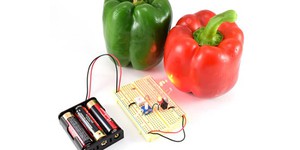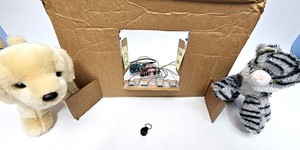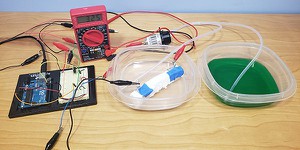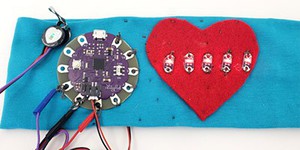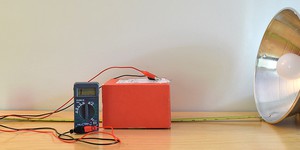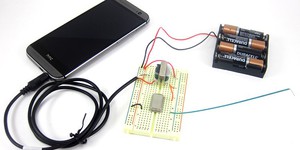High School, Electricity & Electronics Science Projects (51 results)
Stop for a minute and try to imagine your world without electrical power and electronic gadgets.
No convenient appliances in the kitchen, no electric lights. No computers, MP3 players, television, or video games.
Your life would be completely different, wouldn't it? Electricity and electronics are so central to modern life that, paradoxically, they're easy to overlook.
|
Select a resource
Sort by
|
Do you want to trick friends and visitors with an amazing optical illusion? In this engineering design project you will learn how to build an infinity mirror,with built-in lights that make the mirror look like a deep tunnel with no end. But pick the mirror up and look behind it, and you will see that it is only a couple of inches thick! Read this project to find out not only how this illusion works, but how to design and build your very own infinity mirror from scratch.
Read more
Featured
Have you heard that garlic powder is supposed to inhibit the growth of bacteria? Which do you think would make a better disinfectant: a solution of garlic powder or a solution of bleach? This project shows you a straightforward way to compare the effectiveness of different disinfectants (or other antimicrobial agents), by measuring zones of inhibition on a culture plate.
Read more
Remembering to take medicine at the right time can be hard, especially if you need to take multiple medications at different times of day. It might not be a big deal if you forget to take your daily multivitamin, but for some people, forgetting to take medication at the right time can be dangerous. What if you had a device that could not only set off an alarm at the right time, but also automatically dispense the right pills for you? In this project, you will build an automatic medicine…
Read more
New
Engineers are trying to tackle the world's ocean pollution problem using robots. Some robots, like Mr. Trash Wheel and the ship featured in this Mark Rober video, are stationary and collect trash as it flows out of rivers before it gets into the ocean. Others, like the Jellyfishbot, are mobile and can squeeze into narrower spaces to collect trash:
Can you build and test your own trash-skimming robot? If you do not have access to a natural body of water to test it in, you can use a bathtub or a…
Read more
When you go to the supermarket, how do you pick out ripe fruits and vegetables? You might look at their size or color, or feel them for firmness. That might be easy to do when you pick out a half dozen apples, but imagine if you had to examine thousands of apples growing in a field, or strawberries coming down a conveyor belt getting ready for packaging. Suddenly, it is a lot harder to do yourself! What if a machine could pick and sort the produce for you? In this project, you will address part…
Read more
"Alexa, turn on the lights!" Sometimes it is easy to take the technology around us for granted. But have you ever wondered how a smart speaker like an Amazon Echo® knows what you are saying and how it can control lights and appliances in your home? It can seem like magic if you buy a device that just works when you open the box. In this project, you will learn how it works. You will build your own smart home device to control an appliance with voice commands using an Arduino®. Get…
Read more
Does your home have any pet doors or gates for dogs, cats, or other animals? Some automatic pet doors can be set up to allow only certain animals through. These doors can help you control which pets are able to go outside alone or which ones have access to specific food, litter boxes, or toys. But why buy such a door when you can make one? In this project you will build your own automatic pet door that works with a magnetic collar tag. Exactly how you use it is up to you!
Read more
New
Artificial intelligence (AI) programs can now generate photorealistic pictures of people who do not exist in the real world. How can you tell if a picture is of a real person or a fake, AI-generated person? What features of the picture do people use to decide whether the face is real or AI-generated? In this project, you will explore these questions as you ask volunteers to look at both real and AI-generated pictures of human faces.
Read more
Does your dog get bored when you are not home? Do you ever toss them a few treats right before you head out the door? What if you could keep them busy by automatically dispensing treats throughout the day? What about training them to sit in a certain place or even press a button by automatically rewarding them with treats? In this project you will build your own automatic dog (or cat, or other pet) treat dispenser that you can customize to react to different sensors.
Read more
Imagine if you had to take medicine every time you ate, and you had to use a math formula to figure out how much medicine to take based on the nutritional makeup of the food, how you were feeling, and what activities you were planning to do. You might also need extra medicine throughout the day (even in the middle of the night) based on your blood glucose levels. People with diabetes who take insulin do this every day. They use finger sticks and blood glucose meters or a continuous glucose…
Read more
People have a variety of reasons to use heart rate monitors. For example, patients in a hospital might have stationary, bedside equipment monitor their heart rate and alert medical staff in case of an emergency. Somebody going for a run might wear a portable heart rate monitor to keep track of their workout intensity. Heart rate monitors are not all the same—their appearance and function will vary depending on the intended use. In this project you will design, build, and program your own…
Read more
How does the intensity of a light source change as you move away from it? This project describes a method to verify the inverse square law: how light, sound, electrical signals, and gravity each decrease with distance from their source. It does not matter if you are talking about a lightbulb or the sun; this law still applies!
Read more
Have you ever wondered how an AM radio station works? In this project you will learn the basics of how your favorite songs are transmitted by a radio station, by building your own simple AM radio transmitter. You will learn the basics of how a transmitter works, and how you are able to tune to your favorite station and listen to music.
Read more
|
Explore Our Science Videos
Build a Simple Electric Motor
Marble Roller Coaster Science Project
The First Cartoon: Make Your Own Thaumatrope!







